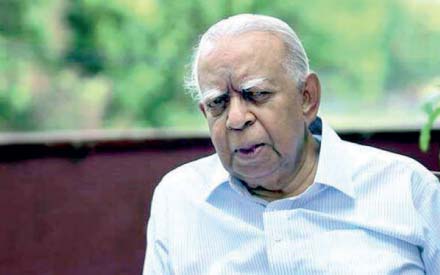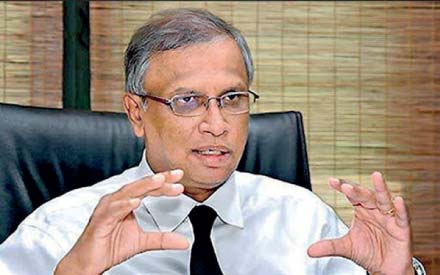Wednesday Feb 18, 2026
Wednesday Feb 18, 2026
Wednesday, 17 April 2024 03:09 - - {{hitsCtrl.values.hits}}

R. Sampanthan

M.A. Sumanthiran
 Who is responsible for emerging religious extremism in Tamil North? Let me tell you, it’s the callously irresponsible Colombo resident Tamil leaderships. In democratic electoral politics, the strength of leaderships lies in how open and committed they stand against injustice and for democratic and fundamental rights. In Sinhala South, mainstream political leaderships took over majoritarian extremism. In post-war Tamil politics, established political leaders failing to stand with their people allows religious extremism.
Who is responsible for emerging religious extremism in Tamil North? Let me tell you, it’s the callously irresponsible Colombo resident Tamil leaderships. In democratic electoral politics, the strength of leaderships lies in how open and committed they stand against injustice and for democratic and fundamental rights. In Sinhala South, mainstream political leaderships took over majoritarian extremism. In post-war Tamil politics, established political leaders failing to stand with their people allows religious extremism.
Where did it actually begin? It began with electing Rajapaksa president in 2005 November. It was accepted North-East would vote Ranil Wickremesinghe en bloc for negotiated peace giving him a fair chance of winning the 2005 November presidential elections. The Tamil diaspora was talking of winning the “Thamil Eelam” instead. They were determined to install “hardline Sinhala-Buddhist” Rajapaksa as president to cry out loud, “No Peace for Tamils” and lobby the West for a “separate Thamil State” with UN Peacekeepers. This arrogant thinking was in line with Prabhakaran’s fierce ambition of a “Thamil Eelam”. An election boycott decided by the LTTE, elected Mahinda Rajapaksa as president with 50.29% and on a slender majority of 180,000 plus votes. In N-E alone 01.22 million had boycotted elections.
Tamil diaspora did not know a hardline Sinhala-Buddhist leader would fight the war to an end, whatever the cost. That the well trained, battle-hardened and experienced LTTE cadre had turned into “administrators” post 2002 February CFA, gaining “lethargic fat” in their mid-forties and early fifties, and were no more capable of leading a battle on the ground. The diaspora was also wholly blind to the fact the 9/11 NY debacle allowed President Bush to push his war agenda on the slogan “war against global terrorism” that included all non-State armed groups. LTTE was no exception, proscribed in about 35 countries including the EU, North America, India and Australia.
When the LTTE was militarily wiped out in May 2009, a weeping and bleeding human tragedy in the devastated Vanni was all that the Tamil survivors were left with. Boycott of presidential elections dumped on them left nothing for their future. Rigidly regimented to live under the LTTE, Tamil people were left even without a political leadership in post-war anarchy. TNA was only a skeletal entity with a namesake presence, having had to play second fiddle to the LTTE.
That was North-East after the war. The Tamil diaspora quickly grabbed the UNHRC Resolutions on Sri Lanka to punish Rajapaksas on war crimes and crimes against humanity. The TNA stood with the UNHRC Resolutions, hyped as “the most important political necessity” of the Tamil people. Meanwhile the LLRC appointed by President Rajapaksa exactly one year after the war concluded, was instead focussed on issues on the ground. It held public sessions in all war affected areas creating space for local Tamil activists to patch together the torn and shredded Tamil society asking for solutions to their immediate grievances.
LLRC interim report
Feeling an urgency in finding remedies to issues of war affected people, the LLRC issued an “Interim Report” in September 2010 recommending among others, (i) a special mechanism to examine cases of long term detainees on a case-by-case basis (ii) list of names of those in detention be published (iii) detainees released should be issued with a certificate of discharge and not taken into custody again (iv) government to issue a clear policy statement that private land will not be used for government backed settlements and also (v) as high priority, illegal armed groups to be disarmed.
Tagged to diasporic and foreign funded anti-Rajapaksa politics in Colombo, the TNA leadership wanted to believe their association with Wickremesinghe government would provide a new Constitution with all answers to the Tamil National Question and completely ignored those very urgent and important recommendations in the LLRC interim report. They also went into unnecessary conflicts with Chief Minister of the NPC, Rtd. Justice Wigneswaran who should have in fact been backed to de-militarise the northern administration with a people centred development program.
No importance given to the LLRC interim recommendations
With no importance given to the LLRC Interim recommendations and to the Final Report tabled in parliament on 16 December 2011, TNA leadership completely ignored recommendations in paragraphs 9.45 to 9.74 under “Chapter 9 – Summary of the Principal Observations and Recommendations be urgently implemented” as proposed in the LLRC Final Report.
Colombo civil society and the TNA should have also insisted on paragraph “8.193 - The Police Department is a civilian institution which is entrusted with the maintenance of law and order. Therefore, it is desirable that the Police Department be de-linked from the institutions dealing with the armed forces which are responsible for the security of the State” read with 9.171 “…The Commission recommends the phasing out of the involvement of the Security Forces in civilian activities and use of private lands by the Security Forces with reasonable time lines being given”.
Despite all the loud noises in the West, the 14-year-old UNHRC Resolutions meant nothing for the North-East Tamil people. The LLRC Final Report in contrast was about the crying needs of war affected people the TNA leadership gave no importance to. That compelled ordinary men and women in North-East to agitate on issues closer to their hearts and to their daily life. What was more urgent and important for them was information on “involuntary disappearances” of their family members before punishing Rajapaksas. They are also serious about regaining their lost lands and their primary sources of daily income.
Where are our beloved?
Though no Tamil political leadership ever thought of supporting the agitating mothers and wives in North and East who were demanding information on “involuntary disappearance”, were not giving them strength by politically mobilising the North-East Tamil society, it is no fun to continue protests for over 2,495 days. No joke to continue agitating for six continuous years and nine months as at end December 2023, asking the simple question, “Where are our beloved?”
It is seven years and more for now with three Presidents after Mahinda Rajapaksa having completely ignored these mothers and wives emaciating in public agitations. On the UN declared “International Day of the Victims of Enforced Disappearances” on 30 August last year, the Association for Relatives of Enforced Disappearances (ARED) issuing a statement claimed, over 180 mothers and relatives who were associated with them have died during the past seven years. Where were the TNA and other political leaders during those seven years?
Adding on to their list of unsolved issues during the past decade are accelerated occupation of their land by Sinhala communities, either ignored by the State or sponsored by Sinhala-Buddhist extremists with State support. The growing conflict in the Mannar and the Northern seas, with no government seriously intervening to stop poaching by Indian fishermen, have even led to clashes in the sea with two Jaffna fishermen reported killed. For the war affected Tamil people, there are fast accumulating grievances neither TNA nor any other political leaders are serious about.
Fallout from shameless political neglect
Fallout from this shameless political neglect is quite evident in North-East election results. After backing two common candidates from the Sinhala South at presidential elections, TNA contested parliamentary elections in August 2015 with a manifesto that pledged for a federal solution. Sampanthan as TNA leader requested all North-East voters to elect a maximum number of MPs from TNA, out of a total of 22 MPs leaving out the Digamadulla electoral district. The TNA leadership said, a strong mandate for a federal solution with a large parliamentary representation would give an advantage in negotiating with Wickremesinghe as head of government, to be elected. Promise of a federal solution being the main slogan the TNA had 14 MPs elected, polling a total of 470,542 votes from 884,326 registered voters leaving out 45,000 plus votes from Digamadulla for the lone MP elected. Two more MPs from the national list totalled 16 TNA MPs.
It was five more years of ever-growing stress and trauma for Tamil people with TNA leadership of Sampanthan and Sumanthiran obsessed in defending the Wickremesinghe government on every issue. With continued callous political neglect, the TNA was left rejected in North-East at the elections in 2020 August. They lost five of the 14 previously elected MPs and got only one from National List. Three other Tamil political entities shared four MPs with TNPF of Gajendra Kumar gaining one National List MP as well. The TNA polled only 327,168 votes, a loss of 143,374 from last 2015 elections though registered voters in 2020 had increased to 1.08 million.
This political slide has not been arrested despite a change of leadership in ITAK that controls TNA politics. Irresponsibility of the ITAK leadership not been challenged with a political alternative, the change seems to reflect a pro-Hindu shift, as an alternative to Sampanthan-Sumanthiran leadership. Nor is there any “pro-people” political alternative even outside the TNA. Absence of a viable secular political leadership often leads to religious extremism/fundamentalism as an alternative. The danger of Hindu extremism taking advantage of the leadership mess in ITAK and the absence of a political alternative in Tamil society is now in the open. A fringe group calling itself “Siva Sena” has issued a statement to say Hindu religion in Sri Lanka is under threat and therefore they need a Hindu presidential candidate this election to bring all Hindus in the country together.
The callous neglect of Tamil people by Sampanthan-Sumanthiran leadership in ITAK is no small mistake that could be erased without a political alternative. That demands a calculated political decision before religious extremism overtakes secular politics.